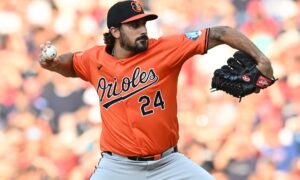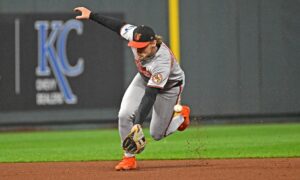SCROLL DOWN TO READ ARTICLE

There was something about the last game of a baseball season that troubled me. One-hundred-and-sixty-one games had been played, but number 162 had a finality to it that triggered a certain sadness. I sometimes would watch the replay later that night to hold on to it for just a little longer.
The playoffs were never guaranteed but those 162 games were. They were my soundtrack in the car, they’d travel to the houses of relatives, they would keep me company from April through September. They symbolized the emergence of spring when there was new growth and the acceptance of autumn, when leaves would die and fall. When I was a kid, they represented the end of a school year — and the anticipation of summer — and the realization that a new school year was just beginning.
I’m missing baseball during this pandemic. Not in a way that I miss being with my children and grandchildren, but baseball has always held a prominent place in my life. It helped me bond with my grandfather, who gave me his passion for the sport. It was part of my relationship with my mom. It was my first date with my wife, Barb. It was a driving force in my desire to become a sportswriter.
Growing up in Baltimore, it was OK to brag about Babe Ruth, even though he was a Yankee. In fact, many of my early favorites played for other teams — Sandy Koufax, Mickey Mantle, Bob Gibson, Willie Mays, Juan Marichal (until he hit catcher John Roseboro with a bat). I liked the St. Louis Cardinals as a team before I became an Orioles fan. Frank Robinson changed that rooting interest, becoming my favorite baseball player of all time.
CONTINUE READING BELOW
I collected baseball cards, and can still smell the bubble gum that came in a pack. Regrettably, I used clothespins to put some of those cards on the spokes of my bike tires for sound effects. They didn’t survive those rides.
Once I became an Orioles fan in 1966, my sophomore year in high school, I would imitate the batting stance of each player. If I was the only one in the living room watching a game, I would have my bat in my hand to practice as each player came to bat. No two players hit alike.
In my backyard, where my dad had built a mini-baseball diamond with marble bases and a chicken-wire backstop, I would play imaginary games with a Wiffle ball, pitching and hitting for both teams. When rain drenched the field, I would throw popups to myself on the marble patio on the side of the house or throw a baseball-sized rubber ball against the brick steps to field grounders. I also threw the rubber ball against the cinder block in the basement during the winter — once throwing it through a basement window.
That wasn’t the only window I broke — the worst being the dining-room window. The shingles on the back of the house also took a beating.
We lived in a neighborhood where kids were encouraged to go outside and play. We got permission to build a field on a vacant lot that connected our neighborhood to the one below it, and another on property purchased by a Methodist home for children who were up for adoption. We used a snow fence for home runs on that one. Eventually, owners of the property built a real diamond with a real backstop.
CONTINUE READING BELOW
Whenever I got a new glove, I would wipe it down with Neatsfoot oil, place a baseball in the pocket and wrap a rubber band around it tightly. I loved my gloves and was heartbroken when I left one out in the rain.
I never bonded with my bats the way I did with my gloves, which might explain why I preferred to play the field. The first shortstop whose style I tried to copy was Luis Aparicio, who would sometimes jump in the air as he made a throw from deep in the hole. When we played Frisbee, often in the street, I would pretend I was Paul Blair whenever I made a long run to catch up to one thrown deep.
The first date Barb and I had — at Memorial Stadium for an Orioles-Red Sox game on August 23rd, 1968 — a batter fouled off a number of consecutive pitches. I think I said that was five in a row. Barb said it was six. I knew she was the one.
I loved being a sportswriter, but you had to retrain your emotions. There’s no cheering in the press box. I once did a story for Baseball Digest on Bump Wills, the son of Maury Wills, whose Dodgers were swept by the Orioles in the 1966 World Series. Bump didn’t have the kind of success that his dad did. I also wrote about Hall of Fame pitcher Gaylord Perry, who was accused of throwing a spitball, after he had defeated the Orioles. He had a dab of what appeared to be Vaseline behind his right ear.
I was listening and then picturing Frank Robinson’s home run off Luis Tiant that cleared Memorial Stadium on May 8th, 1966. I remember observing two seniors sitting on a bench and listening to a spring training game on a transistor radio the day Barb’s mom died. I remember riding in my car one Saturday afternoon when Brady Anderson was picked off first and Jon Miller said he didn’t know what Anderson was thinking but it wasn’t baseball.
I’m thinking about baseball a lot these days, even watching some Oriole classics and games on the MLB Network. It’s something, but it’s not the same.
I’m OK with admitting I miss baseball. There’s a deep connection.
Jack Gibbons spent 46 years in sports journalism, including a chunk of that time as sports editor of The Baltimore Sun. Now retired from full-time work, Jack serves as the lead editor and writer for BaltimoreBaseball.com’s “Calling the Pen,” a periodic feature that highlights baseball essays written by the community. If you would like to contribute to ‘Calling the Pen,” send a 750-1,200-word, original piece via email to jack@baltimorebaseball.com for consideration.
20 Comments
You must be logged in to post a comment Login or Register Here
Leave a Reply
You must be logged in to post a comment.










